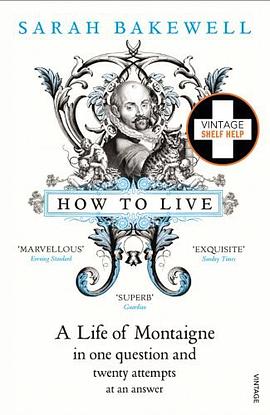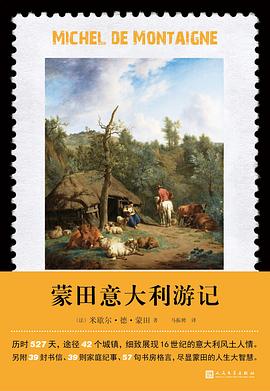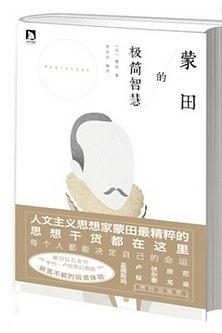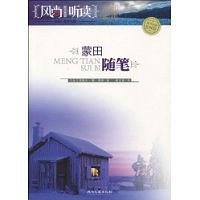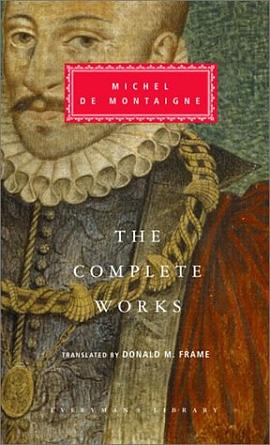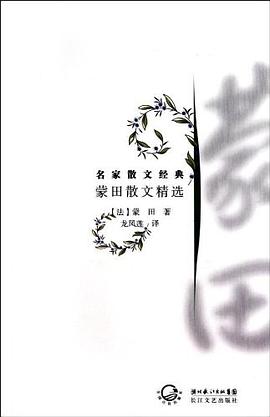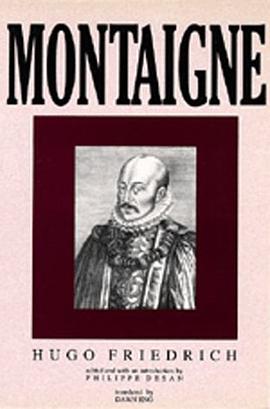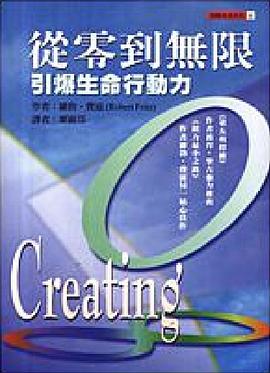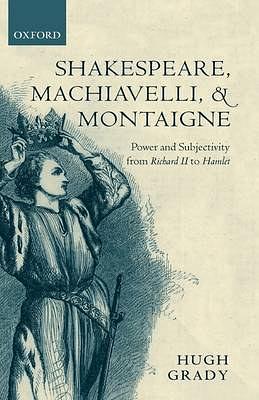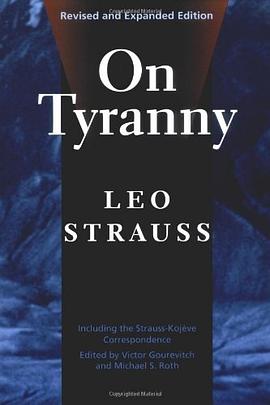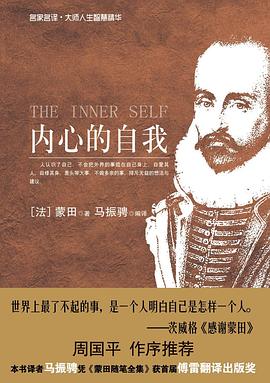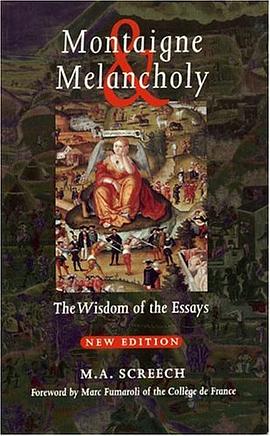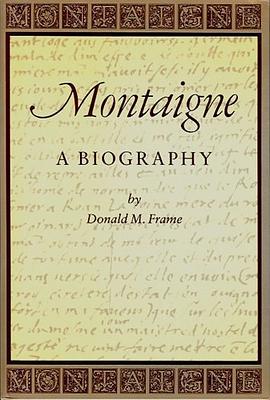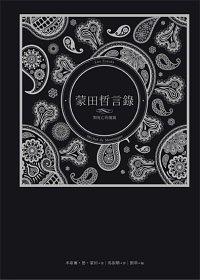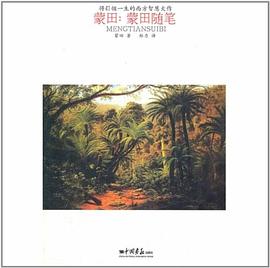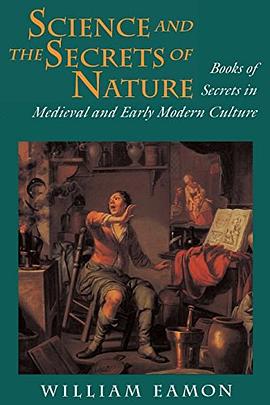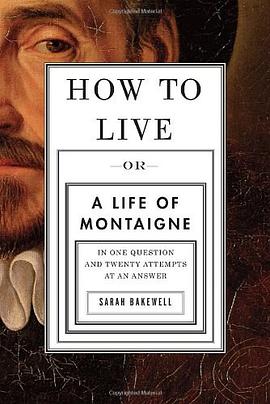

具体描述
Winner of the 2010 National Book Critics Circle Award for Biography
How to get along with people, how to deal with violence, how to adjust to losing someone you love—such questions arise in most people’s lives. They are all versions of a bigger question: how do you live? How do you do the good or honorable thing, while flourishing and feeling happy?
This question obsessed Renaissance writers, none more than Michel Eyquem de Monatigne, perhaps the first truly modern individual. A nobleman, public official and wine-grower, he wrote free-roaming explorations of his thought and experience, unlike anything written before. He called them “essays,” meaning “attempts” or “tries.” Into them, he put whatever was in his head: his tastes in wine and food, his childhood memories, the way his dog’s ears twitched when it was dreaming, as well as the appalling events of the religious civil wars raging around him. The Essays was an instant bestseller and, over four hundred years later, Montaigne’s honesty and charm still draw people to him. Readers come in search of companionship, wisdom and entertainment—and in search of themselves.
This book, a spirited and singular biography, relates the story of his life by way of the questions he posed and the answers he explored. It traces his bizarre upbringing, youthful career and sexual adventures, his travels, and his friendships with the scholar and poet Étienne de La Boétie and with his adopted “daughter,” Marie de Gournay. And we also meet his readers—who for centuries have found in Montaigne an inexhaustible source of answers to the haunting question, “how to live?”
作者简介
Sarah Bakewell was a curator of early printed books at the Wellcome Library before becoming a full-time writer, publishing her highly acclaimed biographies The Smart and The English Dane. She lives in London, where she teaches creative writing at City University and catalogues rare book collections for the National Trust.
目录信息
读后感
蒙田有一句话:“生活本身就是目标,生活本身就是目的。” 或许因为太多人渴望听他讲生活意义,所以他只得给出这样一个放之四海而皆准——也就等于什么也没说——的答案;或许,这正是蒙田对生活的看法。 蒙田的生活态度,接近于佛陀。有一个故事说,有人问佛陀人生的意义是什...
评分很情慾的。 也許這正好是種自戀, 讓讀到的蒙田給自己正中下懷 正中下懷 聽起來就很情慾 蘇格拉底或是尼采、吳爾芙 甚至莎士比亞 有某種質地綿延地在流轉 所有人也各自延伸了各種文本 令人驚訝文學的意義 卻又理所當然似的 也許該重讀張惠菁的蒙田筆記 當年萬萬沒可能讀懂 ...
评分一种记录当下生活与存在的意识流不预设任何目的,让自己沉浸在意识的河水中,探索小说人物每分钟意念的流转,蒙田专注于自己活着的当下,进行单纯的感受。“把意识置于人类存在的核心,因而使意识让它自己感到吃惊”(庞蒂) 拉博埃迪《论自愿为奴》:人民迷恋上了独裁者,以独...
评分一种记录当下生活与存在的意识流不预设任何目的,让自己沉浸在意识的河水中,探索小说人物每分钟意念的流转,蒙田专注于自己活着的当下,进行单纯的感受。“把意识置于人类存在的核心,因而使意识让它自己感到吃惊”(庞蒂) 拉博埃迪《论自愿为奴》:人民迷恋上了独裁者,以独...
评分用户评价
这本书的封面上那简洁的《How to Live》几个字,在初见之时就仿佛一道无声的邀请,让我忍不住想要一探究竟。我一直以来都觉得,关于“如何生活”这个话题,每个人心里都有一套自己的答案,或者说,每个人都在不断地寻找、摸索、甚至跌跌撞撞地去实践。所以,当我看到这本书时,内心深处的那份好奇被瞬间点燃了。我并非那种会对哲学或心理学理论过于钻研的人,我更倾向于从生活本身汲取养分,去理解那些朴素却深刻的道理。这本书给我的第一印象,就是它似乎没有摆出一副高高在上的说教姿态,而是像一位老朋友,温柔地与你分享他的生活感悟。我曾一度认为,生活这东西,是无法被“学会”的,它更像是一种天赋,一种与生俱来的能力。然而,这种想法也常常让我陷入一种莫名的焦虑,仿佛自己总是落在别人后面,无法真正“活出”自己。这本书的出现,让我开始重新审视这个观点。我渴望从中找到一种能够安抚我内心不安的力量,一种能够指导我如何更加从容、更加充实地面对每一天的智慧。我期待它能提供一些实际可行的方法,一些能够帮助我摆脱迷茫,找到属于自己生活节奏的启示。也许,它并不是一本“攻略”,而更像是一面镜子,映照出我内心深处的渴望,并指引我向更美好的方向前行。我迫不及待地想翻开它的第一页,看看这个“如何生活”的答案,究竟是什么模样。
评分《How to Live》这个书名,听起来就有一种探险的意味,仿佛它是一张地图,指引着我去探索生命的未知领域。我一直对那些能够引发深刻思考的书籍情有独钟,而“如何生活”这个主题,无疑是最引人入胜的。我们每个人都在为生活而奔波,但有多少人真正停下来思考过,我们到底是为了什么而奔波?我们所追求的“好生活”,究竟是什么样的?我希望这本书能给我带来一些颠覆性的认知,一些能够打破我固有思维模式的启示。我期待它能够深入到人生的本质,去探讨那些关于幸福、意义、以及人生价值的终极问题。这本书或许会讲述一些关于如何在逆境中保持坚韧,如何在平凡中发现快乐,以及如何在快速变化的时代,找到属于自己的定位。我希望它能够成为我的人生导师,在我迷茫的时候,给我指引方向;在我失落的时候,给我注入力量;在我骄傲的时候,给我敲响警钟。我渴望在这本书中,找到一种能够让我活得更加充实、更加有意义的人生哲学。
评分这本书的标题《How to Live》充满了直接性和普适性,这让我立刻产生了好奇。我们每个人都在“活着”,但“如何活”却是一个需要不断探索和实践的课题。我一直认为,生活并非是一个简单的“存在”状态,而是一个充满动态变化、需要智慧去经营的过程。过去,我可能更侧重于追求物质的丰裕和事业的成功,但随着年龄的增长,我开始更加关注内心的充实和精神的满足。我意识到,真正的幸福,并非仅仅来自于外部的成就,更多的是源于内心的平静和对生活的深刻理解。这本书,我希望能从中找到一些关于如何培养内在力量的启示,如何在高压的生活环境中保持内心的宁静,以及如何在复杂的社会关系中,找到属于自己的立足之地。我期望它能提供一些关于如何审视自我、认识自我,并最终接纳自我的方法。我希望它能引导我思考,生命的真正意义是什么?我应该如何度过我的一生,才能不留遗憾?它或许会讲述一些关于如何在平凡生活中发现不平凡的智慧,如何在忙碌中找到属于自己的节奏,以及如何在瞬息万变的时代,保持清醒的头脑和坚定的信念。我希望这本书能成为我的一位良师益友,在我人生的旅途中,给予我智慧的启迪和精神的慰藉。
评分《How to Live》这个书名,简单而有力,像是一声敲击灵魂的问号,立刻吸引了我。生活,这个我们每天都在经历却又常常感到陌生的主题,究竟该如何去“活”?我常常在想,我们是怎样一步步走到今天的?我们又将走向何方?生活似乎总是有太多的不确定性,太多的挑战,让我们感到应接不暇。我不是一个容易满足的人,也不是一个轻易放弃的人。我一直在努力,一直在尝试,但有时候,我也会感到力不从心,感到困惑和迷茫。我希望这本书能给我带来一些新的思考维度,一些能够帮助我摆脱现状,找到新的方向和力量的启示。我期待它能够深入到生活的各个层面,无论是个人的成长、人际关系的建立,还是对世界万物的认知。我希望它能提供一些实用的方法,帮助我更好地管理自己的情绪,更好地与他人沟通,以及更好地应对生活中的种种不如意。我希望这本书能够教会我,如何在纷繁复杂的世界中,保持一颗纯净的心,如何去发现生活中的美好,以及如何去创造属于自己的幸福。我迫切地想要翻开它,去探索那隐藏在书页背后的,关于“如何生活”的答案。
评分这本书的名字,How to Live,就像一个古老而又全新的命题,在喧嚣的时代,它显得尤为珍贵。我总觉得,我们大多数人,都只是在“过日子”,而不是在真正的“生活”。日子是时间的流逝,是日复一日的重复,而生活,则是一种主动的创造,是一种对生命的热情和投入。我渴望找到一种方式,能够让我从“过日子”的状态,切换到“生活”的状态。我希望这本书能给我提供一些具体的指导,一些能够帮助我唤醒内心深处潜藏的活力,重新点燃对生活的热情的秘诀。我期待它能教会我,如何去拥抱生活中的变化,如何去珍惜生命中的每一个瞬间,以及如何去创造属于自己的独特价值。这本书或许会讲述一些关于如何认识自己,如何发挥自己的潜能,以及如何与世界和谐相处的道理。我希望它能够帮助我摆脱那些束缚我的枷锁,让我能够更加自由、更加自信地去面对生活中的一切。我渴望在阅读这本书的过程中,能够获得一种心灵的洗礼,一种对生命全新的认识,从而能够真正地开始,我的“生活”。
评分这本书的书名,How to Live,极具概括性,却又留下了无限的想象空间。它不像是一本教你如何致富,或者如何成功的指南,而更像是一场关于人生意义的深度对话。我一直相信,生命的价值,并非仅仅体现在外在的成就,更在于内心的充实和精神的富足。我希望这本书能给我一些关于如何培养内在力量的启示,如何在高压的生活环境中保持内心的宁静,以及如何在复杂的世界中,找到属于自己的精神家园。我期待它能够引导我思考,生命的真正意义是什么?我应该如何度过我的一生,才能不虚此行?它或许会讲述一些关于如何与时间握手言和,如何拥抱生命的起伏,以及如何在平凡的日子里,品味出不平凡的幸福。我希望这本书能成为我的一位智慧的向导,在我人生的迷雾中,指引我找到方向;在我遭遇坎坷时,给予我坚持下去的勇气;在我享受成功时,让我不忘初心,保持谦逊。
评分《How to Live》这个名字,直接戳中了现代人内心深处的某种焦虑。我们好像被一种无形的压力推着,不得不“活”得精彩,活得成功,活得令人羡慕。然而,在这种追逐的过程中,我们似乎渐渐迷失了自己,忘记了最初为什么出发。我常常感到一种疲惫,不是身体上的,而是精神上的。我渴望找到一种能够让我卸下伪装,回归真实的生活方式。我希望这本书能给我一些关于如何与自己和解,如何接纳自己的不完美,以及如何在这个快速变化的社会中,保持内心的平静和独立。我期待它能提供一些关于如何发现生活中的小确幸,如何培养积极的心态,以及如何与他人建立真诚连接的建议。它或许会讲述一些关于如何面对孤独,如何处理人际关系中的冲突,以及如何在这个瞬息万变的时代,找到属于自己的安身立命之所。我希望这本书能够像一位温柔的导师,引导我重新审视生活,重新认识自己,并最终,找到属于我自己的“如何生活”的答案。
评分拿到《How to Live》这本书,说实话,我并没有抱有过高的期待,毕竟市面上关于生活哲学的书籍实在太多了,很多都充斥着空洞的说教和 the same old clichés。我是一个务实的人,对于那些空泛的理论,向来是敬而远之。我更关心的是,这本书能否给我带来一些切实的改变,能否在那些日常琐碎的瞬间,给予我一些新的视角和处理问题的方法。在我看来,生活并非是一场宏大的叙事,它更多的是由无数个微小的片段组成,而正是这些片段,构成了我们生活的全部。如何将这些片段串联起来,使其富有意义,这才是真正的挑战。我常常在反思,我所做的这一切,究竟是为了什么?我所追求的生活,又应该是怎样的?这些问题,困扰了我许久。因此,我希望这本书能给我提供一些新的思考方向,一些能够帮助我理清思绪,找到内心平静的线索。它或许会讲述一些关于人生的道理,一些关于如何与自己相处,如何与他人建立连接的智慧,甚至是一些关于如何面对困境的勇气。我希望它不是那种能够让你看完后拍案叫绝的书,而是那种能够让你在某个安静的午后,或者某个失眠的夜晚,若有所思,然后慢慢地,在不经意间,感受到一丝温暖和力量的书。我期待它能成为我生活中的一个良伴,一个能够在我迷失方向时,给予我指引的光亮。
评分当我看到《How to Live》这本书时,我首先联想到的,是那些关于智慧和哲学的经典著作,但又不失一份亲切感。它不像那些晦涩难懂的学术论文,而是仿佛一个知心朋友,在用最朴素的语言,与你分享关于生活最深刻的感悟。我常常觉得,我们活在这个世界上,似乎总是在模仿别人,或者在追逐潮流,却很少真正去倾听自己内心的声音。我希望这本书能帮助我找回那个真实的自己,能够让我更加了解自己的内心需求,并且有勇气去追求那些真正让我感到快乐和满足的事物。我期待它能提供一些关于如何培养独立思考的能力,如何抵制外界的诱惑,以及如何建立健康的人际关系的指导。它或许会讲述一些关于如何与时间和解,如何面对衰老和死亡,以及如何在这个充满不确定性的世界里,找到一份属于自己的安宁。我希望这本书能成为我心灵的港湾,在我疲惫的时候,给我提供休憩的空间;在我迷茫的时候,给我照亮前方的道路;在我彷徨的时候,给我坚定的力量。
评分《How to Live》这本书,当我第一次看到它的时候,脑海中就闪过一个念头:这或许能为我正在经历的困境提供一些出口。我最近感觉自己像是在一个漩涡里,每天被各种琐事缠身,忙忙碌碌,却总觉得丢失了什么。生活似乎失去了原本的色彩,变得有些灰暗和沉重。我开始怀疑自己过去的决定,开始质疑自己是否真的走在正确的道路上。这种感觉非常糟糕,它让我失去了前进的动力,也让我对未来充满了迷茫。我渴望找到一种方式,能够让我重新找回生活的掌控感,能够让我感受到生命的活力和意义。这本书的名字,恰恰触及了我内心最深处的渴望。我不知道它里面具体写了些什么,但我相信,它至少会提供一种新的视角,一种能够帮助我跳出固有思维模式的启发。我希望它不仅仅是讲一些大道理,而是能够深入到生活的肌理中,去剖析那些让我们感到疲惫和无奈的根源。我期待它能给我一些关于如何平衡工作与生活的建议,如何处理人际关系中的摩擦,甚至是如何在面对失败时,不被打垮,而是从中学习和成长。我希望这本书能够成为我的一盏明灯,照亮我前行的道路,让我能够重新点燃对生活的热情。
评分woolf论蒙田提到了与灵魂对话还有通过不同出行态度来看人生也很有趣
评分A very delightful read. And it saddens me that a person as charismatic as Montaigne still has to die. Next up: The Essays.
评分在极其吵杂甚至有时还臭臭的(ktv工作人员的狐臭)环境下读完了。在阅读过程中不断寻找平和的心境。
评分一见如故
评分在极其吵杂甚至有时还臭臭的(ktv工作人员的狐臭)环境下读完了。在阅读过程中不断寻找平和的心境。
相关图书
本站所有内容均为互联网搜索引擎提供的公开搜索信息,本站不存储任何数据与内容,任何内容与数据均与本站无关,如有需要请联系相关搜索引擎包括但不限于百度,google,bing,sogou 等
© 2026 book.wenda123.org All Rights Reserved. 图书目录大全 版权所有

